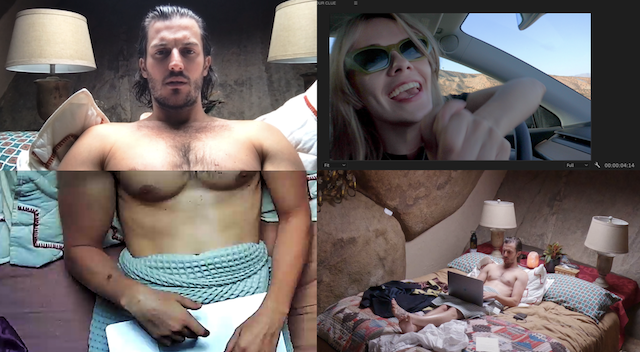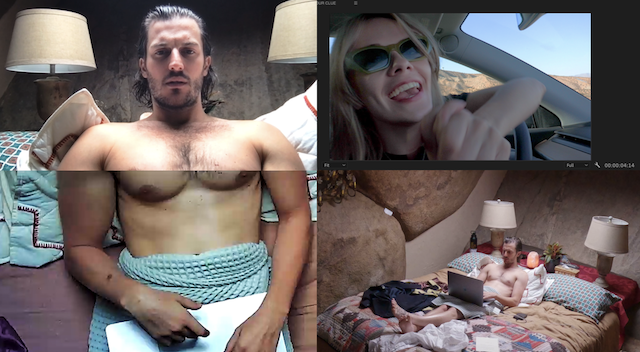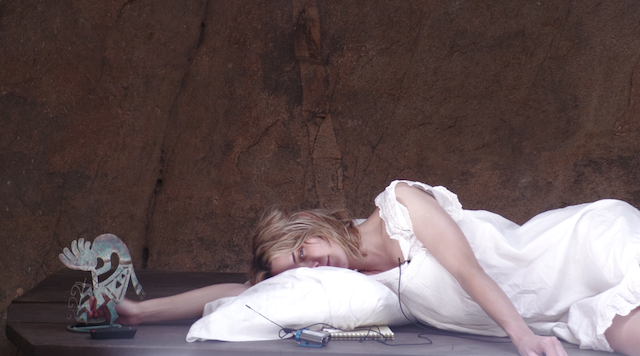
©Courtesy of Fantasia International Film Festival
Making a compelling pandemic-set movie that pushes the cinematic language in new directions can be a challenge for filmmakers. Writer-director Eugene Kotlyarenko did just that with his new experimental comedy, The Code. The feature blurs different cinematic mediums and balances multiple points of view.
The surveillance-driven narrative forgoes celebrating honesty or intimacy to instead encourage greater artificiality. The movie’s collage structure captures the addictive and voyeuristic actions that social media has encouraged in modern society. That behavior encourages the characters to fall deeper into the effects of the COVID-19 pandemic. As a result, their paranoia about the perceptions of their lives grows more intense.
As the story unfolds, it becomes increasingly unclear what’s more unreliable: the image or its makers. The film captures the vapid uncertainty that first arose during the pandemic era about whether there’s any escape from the disingenuous nature of modern society.
In The Code, Celine (Dasha Nekrasova) begins filming a documentary about her failing relationship. Meanwhile, her boyfriend, Jay (Peter Vack), becomes suspicious that she may have an ulterior motive: to cancel him.
In a paranoid attempt to seize authorship over the movie, Jay sets up hidden cameras around their home. By doing so, he hopes to entrap Celine into problematic behavior he can record as insurance. As their secret surveillance escalates, they find themselves creating a documentary full of absurd, erotic and highly performative scenes.
But another couple’s whirlwind marriage puts Jay and Celine’s dysfunctional dynamic into perspective. As a result, the duo must use all the cinematic moments they’ve shared to try and save their love.
The Code is having its World Premiere in the Underground section of this year’s Fantasia International Film Festival. Following its first screening at the festival on July 25, the comedy’s second screening is scheduled for this Sunday, August 4. Kotlyarenko, Dasha and fellow actress Ivy Wolk generously took the time earlier this week to talk about penning, helming and starring in the movie during an exclusive interview over Zoom from Montreal.

©Courtesy of Fantasia International Film Festival
Q : Eugene, you wrote the script for the new experimental dark comedy, The Code. What was the inspiration in scribing the screenplay for the movie?
Eugene Kotlyarenko: It’s an idea I’ve had for a long time. I’ve wanted to show a relationship from both sides – the good and the bad. So I thought, how can I do that in a new way? I then thought, well, I have to incorporate modern technology and social media to show the way that couples really interact with each other.
It took me a long time to figure out, maybe it should be a documentary that one person in the couple is making. Once I figured that out, I had to put it the most intense universal moment that the world has experienced recently – the lockdown. From there, it all came together. I hadn’t really seen that in films – the control of the storytelling of the relationship, which was in flux during the lockdown.
Q : In addition to Dasha and Ivy, the film also stars Peter Vack and Vish Velandy. What was the casting process like for the comedy?
Eugene Kotlyarenko: I basically wrote these roles for these actors. I’m really lucky that I know people who I think are cool and smart. They’re also cinematic in their personal beings. So I just thought that it would be fun to make a movie with my friends.
The movie is quite erotic and different than other movies. So you need to work with people you trust and who trust you. It’s also important to work with people who inspire unconventional and new ideas.
So reaching out to Dasha to play Celine and to Ivy to play her cousin Colette was a no-brainer. It was really easy for me. They were the first people I wanted to work with, so I was lucky they wanted to work with me
Q : Dasha and Ivy, you play Celine and Colette, like Eugene just mentioned, in The Code. What was it about the characters, as well as the overall script, that convinced you to take on your roles?
Dasha Nekrasova: I loved playing Celine. I think she’s a very fun and chaotic character. The thing about the film that stood out to me is that the narrative is essentially a found footage documentary that’s made by Celine. So even though Eugene is the director of the actual film The Code, Celine made the movie within the movie, which is about her relationship. I think that was a lot of fun to portray.
Ivy Wolk: I had a lot of fun playing the part of Colette. It was really wonderful getting to work with everybody that I know and love. It was really comforting.
When I then started doing new things or branching out from things that I had done before, acting-wise, I felt really safe with the people who were around me. I got to be with people who were familiar to me during the whole experience.
In The Code, my character makes a short film and presents it to Dasha and Peter’s characters of Celine and Jay. I was able to direct that movie within a movie with Eugene. Everyone who was in it were my friends from college because I was still in school at the time.
So I was able to start the short before production began on The Code with a bunch of my loved ones. Then production on The Code began, and that was also with a bunch of loved ones. So I felt very close to, and immersed in, the entire process because I loved everyone I was making it with. So it was very special and intimate.
Q : Speaking of directing The Code, Eugene, in addition to writing the screenplay, you also helmed the project. What was your overall approach to directing the feature once production began?
Eugene Kotlyarenko: I’m lucky that I worked with a lot of directors on the movie. Dasha’s a great director, and I think Ivy will also be a great director. Like she said, we co-directed the short that’s in The Code.
But that’s my favorite thing – being able to think something up and then getting to collaborate with people. But it was also challenging and complex – it’s a meta movie that involves a lot of different parts. There were over 70 cameras, and we were trying new things out.
But it’s a comedy, so it’s driven by entertainment. So we were adding more experimental ideas as we tried to figure out how to tell a story that people haven’t seen before. But we were also making sure it was funny and that all of the comedic beats hit for normal audience members who just want to be entertained. That’s the fun and challenge of my job.
We just premiered here at Fantasia a couple of days ago, and people were cracking up from the beginning to the end. To me, that’s a good sign that we nailed it.
Speaking of the humor, with the movie being set during such a serious time as the COVID-19 pandemic, how did you all work to incorporate those more comedic moments into the story?
Eugene Kotlyarenko: The only way to survive in this world is to laugh! Dasha and Ivy are two of the people who crack me up the most in the world. Somehow I became friends with them, which is cool.
The pandemic was obviously a very unique, challenging, scary and tragic experience for a lot of people. The history of the world is filled with tragic experiences. Our jobs as satirists and comedians is to find a perspective on that which is truthful but can also give people relief and humor.
When I talk about this movie, I never say this is a COVID film. I talk about it through the language of rom-com and love. COVID isn’t even in my pitch when I talk about it.
It clearly is a movie that grapples with the experience the entire world went through almost five years ago. Something that Dasha’s character talks about explicitly is that “This is a movie that I need to make right now because in a few years from now, it will be over, and no one will even remember what happened.”
I think we’re entering that cultural amnesia right now. So with this film, we were focused on capturing the details of what was unique about it, and reflect that to audiences.
Ivy Wolk: This character was really fun to play. Obviously, the movie is so funny, but it was a different experience for me. I typically play a more overtly, kind of wild, rambunctious kind of character.
But with Colette, a lot of the humor comes from her being very sweet and romantic, and also being a dreamer. She has a vision of what she wants her life to look like. So that was very fun to play with because that was something that was very different for me.
Since making this movie, I have not played another character like this one. So it was very fun for me to find the humor in a different place than I usually do when I’m building a role.
This script also was so funny. Everyone I was around were also so funny. So it was easy to work together to create the humor.
Dasha Nekrasova: I second that. Like Ivy said earlier, the intimacy of the set made finding the comedic beats easy.

©Courtesy of Fantasia International Film Festival
Q : Eugene, you mentioned using 70 cameras on the set to shoot The Code, which features elements of found footage. How did using so many cameras influence the way you shot the found footage elements?
Eugene Kotlyarenko: All of those cameras really helped! One of the benefits of having them all was that we were easily able to capture the surveillance and reality TV shots.
Dasha, Ivy and the rest of the actors were able to have a ball, and not have to worry that we were going to shoot scenes again with close-ups or from a reverse angle. They were just free to live in the moment.
There were technical and acting challenges to that, too. But overall, it was a unique experience.
Dasha, I don’t know if you want to add anything to that.
Dasha Nekrasova: There were challenging and rewarding moments. I’ve been on sets where I’m doing my coverage and there isn’t even an actor there, which is also challenging in a different way. In a lot of ways, it was almost easier to act so immersivity because there’s a high sense of naturalism and realism, which is super interesting and a lot of fun.
Q : As actresses on the set, how did having so many cameras influence your movements and physicality during the shoot?
Ivy Wolk: We definitely had to be accountable for ourselves in a different way on this movie. In a typical movie, there are one or two cameras fixed on you in a scene.
But with this move, we had to be more accountable of our bodies and positioning because we were being covered from all angles. So there was so much more to think about.
We were worried about our performances, as we had to play to so many different parts of the room. We had to make sure the scenes looked and felt lived in, instead of worrying about where we had to look. So there was a lot to think about. A lot of the times it was tiring, but it was also a great endurance test as an actor.
Q : The Code is having its World Premiere in the Underground sections of this year’s Fantasia International Film Festival, like you mentioned earlier, Eugene. What does it mean to you that the comedy is playing at the festival?
Eugene Kotlyarenko: It’s been great, and why we make movies – to share them with an audience. We want to see how people react to the risks that we take, and the vulnerability we put out there as filmmakers and performers.
We World Premiered the movie a few days ago, and it was great. There were a lot of laughs and feedback from the audience. People were like, “That was amazing and inspiring and funny.”
It means so much when people say it’s inspiring because I’m trying out new things. The performances the actors gave in this movie weren’t like your normal performances. So it’s been a cool experience. I can’t wait for more people to see al of the amazing work these actors have done in this movie!
If you like the interview, share your thoughts below!
Check out more of Karen’s articles.

